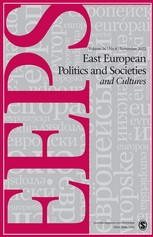The Reform Communist Interpretation of the Stalinist Period in Czech Historiography and Its Legacy
The Reform Communist Interpretation of the Stalinist Period in Czech Historiography and Its Legacy
Author(s): Muriel BlaiveSubject(s): Political history, Government/Political systems, Politics and society, Post-War period (1950 - 1989), Transformation Period (1990 - 2010), Present Times (2010 - today), History of Communism, Politics of History/Memory
Published by: SAGE Publications Ltd
Keywords: Czechoslovakia; historiography; 1950s; 1956; reform communism; postcommunism;
Summary/Abstract: This article is concerned with the continuities in the interpretation of the 1950s in Czechoslovakia from 1956 to the present. It first concentrates on the way the year 1956 (one that remained quiet in the country, as opposed to Poland and Hungary) has been treated in Czechoslovak historiography. It aims to show that an almost exclusive focus on political history has produced until today a misleading image of this apparent communist stability as based on repression rather than on a genuine basis of support for the communist rule. The German historiography of communism shows the usefulness of a socio-political approach that could serve as model. The article then further retraces the permanence of this misleading interpretation to the influence of a highly politicized narrative of the terror period inspired by the work of historian Karel Kaplan and other intellectuals of the Prague Spring era. For this it makes use of Kaplan’s autobiography, which has only ever appeared in French. One particular point of interest is the historiographical treatment reserved to the Stalinist leader Klement Gottwald. The article suggests that this reform communist narrative, which blames the terror on the Soviets without questioning the responsibility of Czech society, has kept the history of the 1950s in Czechoslovakia from evolving at the same pace as the historiography of the post-1968 period. It therefore needs to be acknowledged and challenged.
Journal: East European Politics and Societies
- Issue Year: 36/2022
- Issue No: 03
- Page Range: 992-1014
- Page Count: 23
- Language: English
- Content File-PDF

